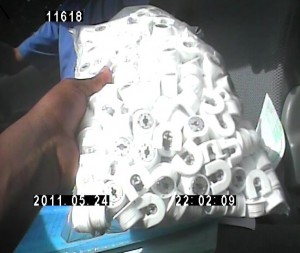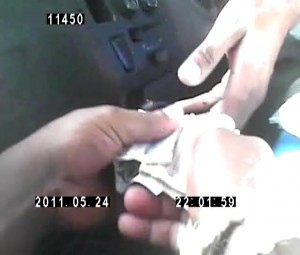
Covert Footage – Proof Buys
When briefed by a client about stock going missing from his warehouse, Justicia’s investigators quickly determined that it had to be an inside job, so they infiltrated an undercover agent and set the wheels in motion to solve the “case of the dodgy driver.” In a country where shrinkage in companies is rife, with some taking “just a little” for themselves and others involved in large scale theft from their employers, we are frequently presented with cases of stock loss for further investigation. In “the Case of the Dodgy Driver”, we were briefed by a client regarding stock going missing from a warehouse. At his wit’s end, the client was not able to determine how his stock was disappearing, but he believed that it had to be an inside job. We were requested to investigate the allegations of theft and decided to assess the situation to verify the suspicion, before planning corrective action. Our initial suspicions were verified on further assessment and a decision was taken to infiltrate an undercover agent in the hope of establishing the extent of syndication and apprehending perpetrators. It was essential to ensure that crime, as opposed to system failures, was the cause of the stock loss and then gather information on the extent to which individuals were involved in crimes causing stock losses. The undercover agent placed in the warehouse as a picker, was tasked to build a trust relationship with the other employees in an effort to ascertain where and how the stock loss was taking place. The agent soon gained the trust of the employees and discovered that stock was being stolen by a driver. To advance the plan, the undercover agent was then moved to the position of driver’s assistant. How was stock being stolen when consignments were checked before being dispatched? Stock was put aside for loading the night before it was due to be loaded into the van. This was then checked and the stock was loaded the following day. It was discovered that, after the consignment had been loaded, the packers would add the additional boxes that had been requested by the driver. The driver had his own customers that he met along his route to make his “private” sales.

Covert Footage – Money Changing Hands
Two Proof Buys were Set Up Two proof-buys were set up between the undercover agent, the driver and a further undercover agent, a Justicia Investigations investigator posing as a buyer. The driver had been very keen to meet the buyer (investigator) and even commented, “The more the merrier”. Covert cameras were used to capture transaction footage of the driver and gather evidence against him. The buy occurred as planned with the “new client”. After the sale, the driver split the cash with his assistant, the undercover agent. Should the matter have been dealt with in accordance with Criminal Law, steps would have been required to indemnify the undercover agent. The driver was however apprehended, confessed and was polygraphed by Justicia Investigations to corroborate evidence and confirm his statement. The evidence was then presented in the internal hearing of the driver, including footage of the proof-buy and a statement of the undercover agent taken without divulging his identity. It is very important to ensure that all steps of an investigation are carried out in such a way, that entrapment is not evident. There are clear directives and decided cases in the Labour Law on trapping suspects and at Justicia Investigations we make use of these directives when deciding on the required intervention. In NUMSA obo Abrahams/Guestro Wheels [2004]4BALR520 (CCMA) the employee was dismissed after making out false invoices for the sale of rims to an “undercover agent” and receiving money from the agent in return. Here also, the employer had been experiencing severe stock losses and called on the services of an undercover agent in view of apprehending the culprits. The agent purchased stolen goods from the employee and the employee was dismissed. The trap was set up on the basis of reasonable suspicion because it was discovered that the employer suffered severe shrinkage. The employer had not used unfair methods to lure the suspect to commit the offence and this dismissal was found to be accordingly fair. “We had tons of evidence against the perpetrators.” – Conrad Van Der Merwe, Director Justicia Investigations In the case of our client, all the conditions for a fair and legal trap were present. The employer requires reasonable suspicion against the employee, however comprehensive evidence of the employee’s involvement in theft from this particular client, was gathered via an undercover agent and subsequent “proof-purchases” conducted. Our investigative interventions were legitimate and potentially effective:
- A thorough investigation was conducted to gather relevant facts over a two-month period by infiltration of an undercover agent.
- Documentary evidence was gathered in the form of stock sheets showing variations. Factual information was backed up with video footage, audio evidence and polygraph tests.
- The suspected employee was correctly trapped during his illicit operations.
- Witnesses were called to give truthful and relevant testimonies.
- With the suspect removed from the system, stock losses were immediately reduced relatively quickly, the entire investigation being concluded within 10 weeks. A month later, a team of Justicia Investigations investigators in another province brought down a similar syndicate in another branch of the same client’s business, proving that this was not an isolated incident.


